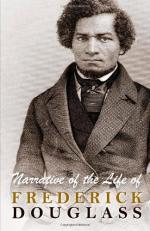|
|
The Narrative of the Life of Frederick Douglass Topic Tracking: Religion
Chapter 1
Religion 1: Douglass writes about the growing population of mixed children. They are quite common, so much so that a law has to be established to designate them as legally colored. For Douglass, this new class of mixed children nullifies the argument that slavery is justified in the scriptures. Some religious people believe that God cursed the descendants of Ham, therefore, they are condemned to a life of slavery. But the presence of mulatto children brings up the question: what about the children of mixed parentage? Does God curse them too?
Chapter 2
Religion 2: When Douglass first arrives at Colonel Lloyd's plantation, the overseer in charge is Mr. Severe, a cruel and bitter man whom the slaves loathe. Shortly after Douglass's arrival Mr. Severe passes away. The slaves disliked him so much that they consider his death a blessing from God. They attribute it to God's merciful providence because the slaves consider the one who replaces him, Mr. Hopkins, a good overseer.
Chapter 5
Religion 3: Out of all the slave children on the Great House Farm, Douglass is chosen to go live in Baltimore. Douglass ponders on this fateful turn of events and confesses that he has always believed slavery would not take hold of him. He attributes this conviction to God, saying that even at the lowest points of his life as a slave, he would be urged on by his faith in God.
Chapter 8
Religion 4: Douglass regards the treatment of his grandmother as a great tragedy. After years of faithful service to her master, her family is sold off and she is left to die alone. In quoting a poem from Whittier, Douglass can only ask, "Will not a righteous God visit for these things?" The unjust fate of his grandmother makes Douglass question if God is indeed righteous.
Chapter 9
Religion 5: Master Thomas finds religion in a Methodist camp meeting. But he does not become a kinder master. Although there are some religious folks, like Reverend George Cookman, who advocates the emancipation of slaves, Douglass finds many more instances of religious hypocrisy at St. Michael's. When a young white man sets up a Sabbath school for the slaves, it is closed down after a few classes by religious folks wielding weapons. Master Thomas's cruelty to slaves, especially to a crippled girl named Henny, makes Douglass question how his master can believe he is justified religiously. Master Thomas claims to hold slaves for the sake of taking care of them.
Chapter 10
Religion 6: Douglass compares Mr. Freeland with some of the other masters he has had before. Mr. Freeland is the best master he has had, partly because he is not a religious hypocrite. However, many extremely religious masters are often the cruelest slaveholders. Douglass regards one such reverend, Mr. Rigby Hopkins, the greatest religious hypocrite. Mr. Hopkins beats his slave for any and every reason, using piety as his justification.
Appendix
Religion 7: Douglass makes many critical remarks about religious hypocrisy. But he takes the subject matter seriously-to the point that he feels he needs to clarify his views of religion in an appendix. Douglass makes the clear distinction between the Christianity practiced by the slaveholders in the South with the Christianity of Jesus Christ. He regards the former as a distorted version of the latter, which is pure, loving, and sacred. Douglass is strongly against the former, but embraces the latter. And he regards his work as an abolitionist to be a sacred cause.




